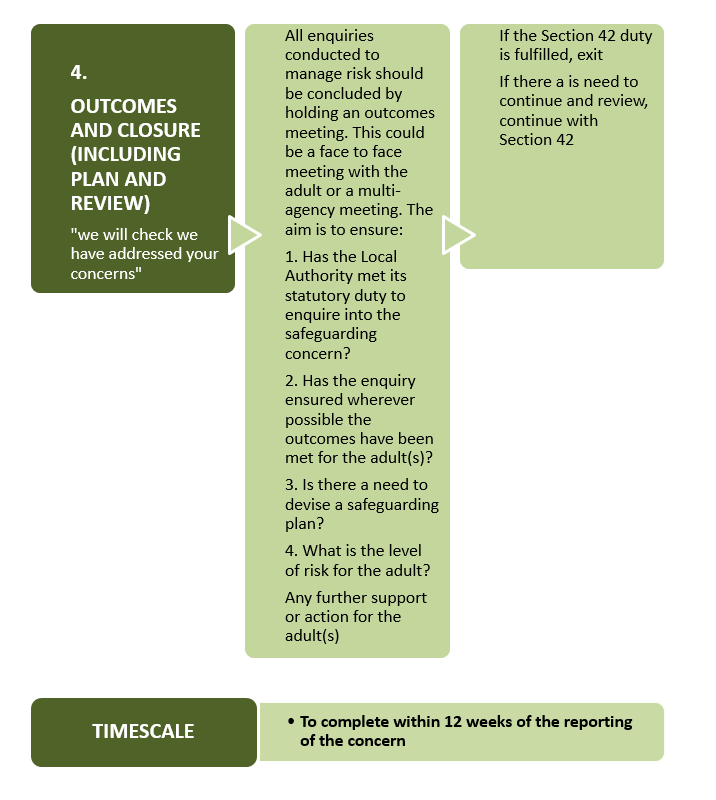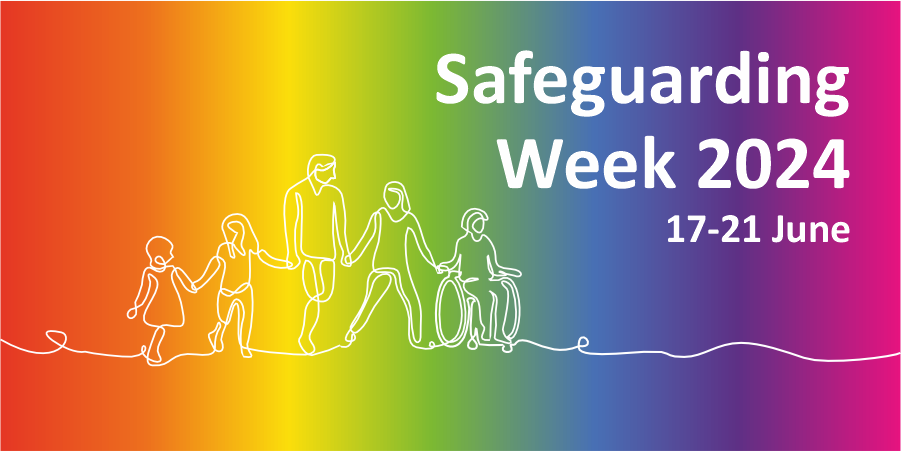Stage 4 – Outcomes and Closure (including Plan and Review)
- 8.1 Final Outcome to the Enquiry
- 8.2 Closing Enquiries down when other Processes Continue
- 8.3 Evaluation by the Adult at Risk
- 8.4 Safeguarding Plan and Review
- 8.5 Review of the Enquiry (optional)
- 8.6 Recovery and Resilience

8.1 Final Outcome to the Enquiry
A Safeguarding Enquiry can be closed at any stage.
Individuals should be advised on how and who to contact with agreement on how matters will be followed up with the adult at risk if there are further concerns.
It is good practice where a care management assessment, Care Programme Approach (CPA), reassessment of care and support, health review, placement review or any other pre-booked review is due to take place following the safeguarding enquiry, for a standard check to be made that there has been no reoccurrence of concerns.
Closure records should note the reason for this decision and the views of the adult at risk to the proposed closure.
The Safeguarding Co-ordinator responsible should ensure that all actions have been taken, building in any personalised actions:
- Agreements with the adult at risk to closure;
- Referral for assessment and support;
- Advice and Information provided;
- All organisations involved in the enquiry updated and informed;
- Feedback has been provided to the referrer;
- Action taken with the person alleged to have caused harm;
- Action taken to support other service users;
- Referral to children and young people made (if necessary);
- Outcomes noted and evaluated by adult at risk;
- Consideration for a SAR;
- Any lessons to be learnt.
8.2 Closing Enquiries down when other Processes Continue
The safeguarding process may be closed, but other processes may continue, for example, a disciplinary or professional body investigation. These processes may take some time to conclude.
Consideration may need to be given to the impact of these on the adult and how this will be monitored.
Where there are outstanding criminal investigations and pending court actions, the adult safeguarding process can also be closed providing that the adult is safeguarded.
All closures no matter at what stage are subject to an evaluation of outcomes by the adult at risk. If the adult at risk disagrees with the decision to exit safeguarding, their reasons should be fully explored and alternatives offered.
At the close of each enquiry there should be evidence of:
- Enhanced safeguarding practice ensuring that people have an opportunity to discuss the outcomes they want at the start of safeguarding activity;
- Follow-up discussions with people at the end of safeguarding activity to see to what extent their desired outcomes have been met;
- Recording the results in a way that can be used to inform practice and provide aggregated outcomes information for Safeguarding Adults Boards.
All enquiries conducted to manage risk should also work towards achieving agreed outcomes. Considerations should be:
- Has the local authority met its statutory duty to enquire into the safeguarding concern?
- Has the enquiry ensured the safety of the adult(s)?
- If this has not been possible, has a safeguarding plan been formulated which works with the adult’s wishes to live with a degree of risk which the plan seeks to manage?
- A review of the safeguarding plan within 3 months of any outcomes determination.
8.3 Evaluation by the Adult at Risk
- Were the desired outcomes met? (In exploring this, there is a need to clarify whether they were):
- Fully met
- Partially met
- Not met
- Do they feel safer? – Has risk been:
- Removed
- Reduced
- Remains
The evaluation is that of the adult, and not of other parties. Whilst staff may consider that enquiry and actions already taken have made the adult safe, and that their outcomes were met, the important factor is how actions have impacted on the adult.
This should be clarified when assessing the performance of safeguarding and some local authorities may ask additional quality questions as part of their finalisation process to inform future practice.
8.4 Safeguarding Plan and Review
The Safeguarding Plan is not a care and support plan, and it will focus on care provision only in relation to the aspects that safeguard against abuse or neglect, or which offer a therapeutic or recovery based resolution.
The Safeguarding Plan should set out what steps are to be taken to assure the future safety of the adult at risk and could include:
- The provision of any support, treatment or therapy, including on-going advocacy;
- Any modifications needed in the way services are provided;
- How best to support the adult through any action they may want to take to seek justice or redress;
- Any on-going risk management strategy as appropriate.
The plan should outline the roles and responsibilities of all individuals and agencies involved, and should identify the lead professional who will monitor and review the plan, and when this will happen.
The Safeguarding Plan should be person-centred and outcome-focused and made with the full participation of the adult. In some circumstances it may be appropriate for the safeguarding plan to be monitored through ongoing care management responsibilities. In other situations a specific safeguarding review may be required.
8.5 Review of the Enquiry (optional)
The identified lead should monitor the safeguarding plan on an on-going basis, within agreed timescales. The purpose of the review is to:
- Evaluate the effectiveness of the Safeguarding Plan;
- Evaluate whether the Safeguarding Plan is meeting/achieving outcomes;
- Evaluate risk.
A review of the safeguarding plan, and decisions about the plan should be communicated and agreed with the adult. Following the review process, it may be determined that:
- The Safeguarding plan is no longer required; or
- The Safeguarding plan needs to continue.
Any changes or revisions to the Safeguarding Plan should be made, new review timescales set (if needed) and agreement reached regarding the lead professional who will continue monitoring and reviewing; or, it may also be agreed, if needed, to instigate a new adult safeguarding Section 42 Enquiry.
New safeguarding enquiries will only be needed when the Local Authority determines it is necessary. Any ongoing risks need to be monitored and reviewed. If the decision is that further enquiries would be a disproportionate response to new or changed risks, further review and monitoring may continue.
8.6 Recovery and Resilience
The adult who has experienced abuse and neglect may need to build up their resilience. This is a process whereby people use their own strengths and abilities to overcome what has happened, learn from the experience and have an awareness that may prevent a reoccurrence, or at the least, enable people to recognise the signs and risks of abuse and neglect, and know who to contact for help and how to do this.
Resilience is supported by recovery actions, which include the adults identifying actions that they would like to see to prevent the same situation arising and is evidenced by:
- The ability to make realistic plans and being capable of taking the steps necessary to follow through with them;
- A positive perception of the situation and confidence in the adult’s own strengths and abilities;
- Increasing their communication and problem-solving skills.
Resilience processes that either promote wellbeing or protect against risk factors, benefit the adult and increase their capacity for recovery. This can be done through individual coping strategies assisted by:
- Strong personal networks and communities;
- Social policies that make resilience more likely to occur;
- Handovers/referrals to other services for example care management, or psychological services to assist building up resilience;
- Restorative practice.
If no further safeguarding action is required, then the safeguarding process can be exited and the enquiry closed.





 View all our news
View all our news